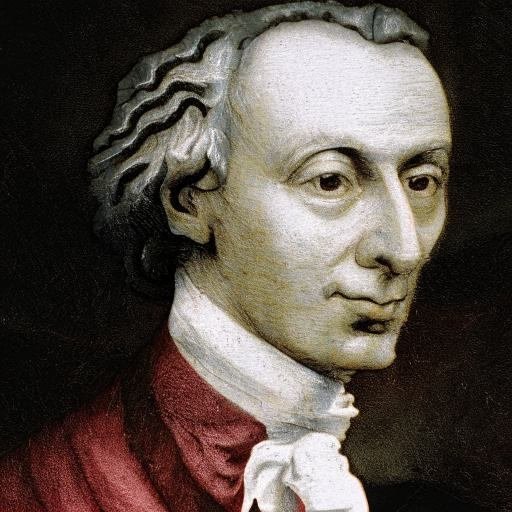
【3分古典要約】純粋理性批判 [3-Min Classical Summaries] Kritik der reinen Vernunft
お越しいただきましてありがとうございます!
古典のエッセンスにふれ、感慨深いインサイトが
訪れることを祈っています!
いってらっしゃい!
【著者】
イマヌエル・カント
【画像】

【5か条要約】
〇人間の知識についての問題を扱った、哲学史上最も影響力のある著作の一つ。
〇知識には「経験に基づく知識」と経験に依存しない「理性による知識(純粋理性)」がある。
〇「純粋理性」で普遍的な知識(真理)の獲得方法と信頼性の検証を行った。
〇その結果、経験や理性だけで答えられない「超越論的な(理性の力を超える)」領域が判明
〇人間の知識と理性の限界に関する重要な問いかけを提起し、 哲学や科学の分野で大きな影響を与えた。
【いい感じの要約】
人間の知識についての問題を扱った、哲学史上最も影響力のある著作の一つ。 ざっくりいうと、この本は私たちが知ることができるものと、知ることができないものを探求した本です。人が外の世界をいかに認識するかを問う認識論において革命を起こし、カントは近代哲学の祖と呼ばれるようになりました。
知識には「経験に基づく知識」と経験に依存しない「理性による知識(純粋理性)」があります。経験に基づく知識(経験的知識)はあくまで個別的で限定的であり、普遍的な真理を発見するためには経験に依存しない理性に頼る必要があります。感覚的な経験から得た情報を処理するための基本的な概念である「先験的形式」という枠組みが知識獲得に必要であり、純粋な論理や推論を通じて普遍的な原理や法則を導き出すことが可能であるとして、それらは経験に依存しない普遍的な真理となると考えました。
しかし、「先験的形式」をもってしても私たちは例えば神が存在するかどうかについて知識を獲得することはできません。なぜなら、私たちは神を見たり触れたりすることができないからです。つまり、彼は経験や理性だけで答えられない「超越論的な(理性の力を超える)」領域があると気づたのです。
このように「純粋理性」で普遍的な知識(真理)の獲得方法と信頼性を模索していった結果、一つの結論にたどり着きます。
それは世界がまず存在し、私たちはその世界を認識するという考え方から私たちが世界を認識することによって、初めて世界が存在するというものでした。コペルニクスによる天動説から地動説への転回にたとえて、この考え方を自ら「コペルニクス的転回」と呼びました。ここに認識自体を問う近代的な認識論が成立することになります。
【御礼】
最後まで見てくれてありがとうございます!
このスレッドを最後まで見てくれた方は
以下2つをしていただけるとうれしいです!!
(またがんばろうって気になります)
古典や書籍の要約に興味ある方は
■Twitterアカウント
https://twitter.com/iorin1379をフォロー
2.ブックマークもかねてこの記事に「スキ」をぽちっとな♪
[5 Articles Summary]
This is one of the most influential works in the history of philosophy, dealing with the problem of human knowledge.
Knowledge includes "knowledge based on experience" and "knowledge by reason (pure reason)," which does not depend on experience.
He verified the method of acquiring universal knowledge (truth) and its reliability by "pure reason.
The results revealed a "transcendental (beyond the power of reason)" realm that cannot be answered by experience and reason alone.
He raised important questions about the limits of human knowledge and reason, and had a major impact on the fields of philosophy and science.
He also made a number of important contributions to the field of philosophy and science, including the following.
[good summary]
One of the most influential works in the history of philosophy, dealing with the question of human knowledge. Briefly, the book explores what we can know and what we cannot know.
Revolutionizing in epistemology, which questions how people perceive the outside world, Kant has come to be called the founder of modern philosophy. There are two types of knowledge: knowledge based on experience and knowledge by reason (pure reason), which does not depend on experience. Knowledge based on experience (empirical knowledge) is only individual and limited, and to discover universal truths we must rely on reason, which is independent of experience.
The framework of "a priori forms," which are fundamental concepts for processing information obtained from sensory experience, is necessary for knowledge acquisition, and as it is possible to derive universal principles and laws through pure logic and reasoning, they would become universal truths that do not depend on experience.
However, even with "a priori forms" we cannot acquire knowledge about, for example, whether God exists. We cannot see or touch God, because we cannot see or touch God. He discovered that there is a "transcendental" (beyond the power of reason) realm that cannot be answered by experience and reason alone. After searching for a way to acquire universal knowledge (truth) and reliability with "pure reason" in this way, he arrived at one conclusion.
That is, he went from the idea that the world first exists and we perceive it to the idea that the world exists only when we perceive it. He himself called this idea the "Copernican turn," likening it to Copernicus' turn from the celestial to the geocentric. This is where modern epistemology, which questions cognition itself, is established.
この記事が気に入ったらサポートをしてみませんか?
